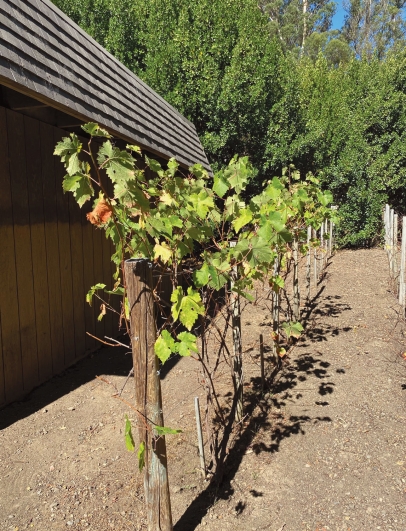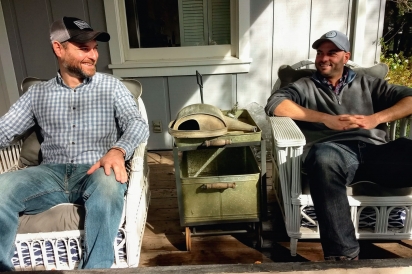MacDonald Vineyards
A TINY VINEYARD PLANTED IN MILL VALLEY INSPIRES THE PRESERVATION OF A NAPA VALLEY LEGACY—AND A BIG FIGHT
NEXT TO A wooden carport in a hillside residential neighborhood in Mill Valley grows a miniscule “vineyard,” planted long ago to Pinot Noir. Yet to produce a mature cluster of grapes, its fruit hasn’t gone into a single bottle of wine. That vineyard, though—in addition to helping to sustain the abundant local bird population—is the symbolic “start” that has grown into very fruitful career.
The vines in this yet-to-be-viable plot of Mill Valley Pinot— despite being grafted from one of California’s most prestigious vineyards—were planted as an experiment by a then-teenaged Graeme MacDonald in the backyard of his parents’ home. While the vines still struggle for viability, Graeme himself has ascended since that planting to tending one of the most revered vineyards in the Napa Valley.
WHAT’S IN A NAME
From a formidable redoubt—surrounded by the world-renowned To Kalon vineyards of Mondavi and Beckstoffer fame—Graeme and his brother Alex MacDonald produce just 400 cases of Cabernet Sauvignon from grapes harvested from a third of their 15-acre property. The remainder of the MacDonalds’ prized grapes have historically been purchased by Robert Mondavi Winery to form the backbone of its most prestigious To Kalon and Reserve bottlings.
MacDonald Vineyards’ own wines, priced at a hefty $175 a bottle, are considered world-class themselves, meant for long aging, perhaps as much as 30 years.
Graeme, 36, says it was Ms. Holland, his English teacher at Mill Valley’s Tamalpais High School, who encouraged him to pursue grape-growing and winemaking on his family’s vineyard in Napa Valley.
“I was burning out on school and was a willful student,” Graeme explains. “One Monday she inquired about what I had done [over the weekend], and I enthusiastically told her about our grandparents’ vineyard. She said I needed to consider that as a good match for my personality. That comment opened my eyes to grape-growing as a possible complement toward my love of growing plants.”
Fast forward to today, where Graeme is now the farmer and winemaker at his family’s organic vineyard. And what a vineyard it is, situated smack-dab in the middle of possibly the most hallowed, as well as litigated over, plot of soil in the country.
To Kalon was the name given to the surrounding land, and the wine produced on it, by pioneer Napa Valley vintner H.W. Crabb, who lived and worked in the area in the mid to late 1800s. The name loosely translates to “the highest good” or “highest beauty” in Greek.
Its present owners are Andy Beckstoffer, whose 89 acres are located directly across from the iconic Oakville Grocery, and Constellation Brands, Inc., the publicly traded consumer products giant and current owner of Robert Mondavi Winery, whose portion lies a bit farther south. On the western edge of Mondavi’s property, across a small asphalt road and divided by a creek narrow enough to jump over, is the MacDonalds’ vineyard.
Robert Mondavi Winery was established in 1966, acquiring much of the historic Crabb estate. It trademarked the name To Kalon in 1988, and six years later trademarked To Kalon Vineyard for its premium wines.
And the lawsuits ensued. Legal battles involving Mondavi and Beckstoffer, and others, have been ongoing for decades, the parties turning to the courts to determine who owns the rights to the storied name. Because to have the name To Kalon on a label is well worth fighting over, with prices reaching into the high three figures for a single bottle of the prized juice.
But don’t be lulled into thinking Graeme and Alex MacDonald are just two lucky heirs resting on their duffs. Talking to them as we walk their family’s To Kalon–adjacent vineyard (the property is shared by Graeme and Alex’s parents and their aunts and uncles), it becomes evident that these guys are not in it for the laurels or the acclaim that could be theirs.
To wit: The MacDonald family’s decades-long arrangement of selling a large percentage of their grapes, first directly to Mr. Mondavi himself, and for the last 15 years to Robert Mondavi Winery owner Constellation Brands, one of the largest winery holding companies in the world, may soon come to an end. When I visited with them this past July, the brothers were waiting on a response to the letter they had sent to Constellation, asking to revisit the terms of their contract.
In a more recent development, Constellation has declined to buy the MacDonalds’ fruit this year because of the risk of “smoke taint” from surrounding fires. The MacDonalds have found other buyers for the grapes.
A CREEK NARROW ENOUGH TO STEP OVER
Not so “in the background” is a festering relationship with Constellation over the MacDonalds’ move to have the creek that separates their property from the Mondavi land legally designated To Kalon Creek. The U.S. Board on Geographic Names, the federal body that has jurisdiction over the matter (https://www.usgs.gov/core-science-systems/ngp/board-on-geographic-name), granted the designation. Then Constellation Brands petitioned the Board to strip the creek of the To Kalon name, with the stated intention of protecting its trademarks.
According to Graeme, there is a lot of local support for the naming of To Kalon Creek, including from the Napa County Board of Supervisors, from Congressman Mike Thompson, who represents the 5th District of California including all of Napa County, and from California State Senator Bill Dodd, who represents the 3rd Senate District, which includes Napa. Some heavy hitters in the local wine industry have also voiced their support, including the other To Kalon vineyard owner Andy Beckstoffer, as well as, Carlo Mondavi, Robert Mondavi’s grandson, according to the MacDonalds.
According to Alex, Constellation argues, in a 1,600-page court filing, that To Kalon is a brand, able to be placed on any of its wine labels—regardless of where the grapes in the bottle originate. In direct contrast, the MacDonald brothers believe it’s a place, the ground from where grapes grow.
To Kalon is a place, not a brand, and it always been so. It has geographical meaning in the community. If they overturn [the name of the creek] it will be detrimental to wine—in terms of place,” declares Graeme, who claims that his great uncle wrote the history of To Kalon many years ago. Graeme himself has curated a treasure trove of To Kalon–related historical documents.
“To Kalon is precedent for history tied to the land, not a commodity,” he continues, and further states that Constellation initially lent its support to the naming, something that, according to Graeme, the company’s attorney now denies. The brothers also say they have turned down a potentially very lucrative offer from Constellation that would have licensed them the right to place “To Kalon” on their labels— in exchange for renaming the creek.
“There is no plan to add To Kalon to our label due to the trademark issues and Constellation’s litigious nature,” says Alex, emphatically. “It is ironic since Mondavi has made wines that consist of up to 90% of our grapes which it labels as To Kalon, and includes our family’s vineyard as part of the To Kalon Vineyard in its marketing material.”
Two thirds of MacDonald’s grape production each year, until 2020, has been sold to Mondavi. The Reserve has contained about 20% MacDonald fruit, depending on the year, while the Mondavi To Kalon has 50–90% of the MacDonalds’ fruit.
I reached out to Constellation Brands, Inc., for a response to the MacDonalds’ version of these events, but as of the day this issue went to print I had not received a response.
It is fair to say that by all indications the 66-year business relationship with Robert Mondavi Winery is in real jeopardy.
“It’s a tough situation because I love the relationship with the Mondavi family. …Our family is deeply saddened,” says Graeme.
I would venture that Robert Mondavi’s late wife, Margrit, who inscribed in his copy of her 2012 memoir: “For Graeme— Please enjoy the story of my life and keep the To Kalon story alive,” would not be pleased, either.
WHAT THE FUTURE HOLDS
When I first spoke with the MacDonalds at the beginning of 2020, I had heard talk of offers being thrown their way to buy the family’s vineyard. And why not? It would fetch millions given the proximity and the quality of the grapes that are coming off the land.
“No offers since we discussed [it] last time,” responds Alex. “Also, [we have] zero interest in entertaining the idea of selling. Our goal has always been to share what we are doing with our children and grandchildren.”
Adds Graeme, “I have a favorite quote that describes a multigenerational family vineyard: ‘You don’t start raising a child at birth, but a hundred years before they are born because that is when you start shaping the environment they are born into.’ This vineyard is not ours to sell, but to preserve for future generations, and we are very grateful to make wine from old vines because the generations before us planted the vines and laid the foundation for that to be possible.”
Graeme further explains, “We are currently exploring regenerative farming techniques in the vineyard and increasing site biodiversity. … Today, we are farming as usual in Oakville, focusing on family and connecting our 2½- and 4½-year-olds with the land that they will someday farm.”
Back in the day in Mill Valley, Graeme says his family “never pressured us to join the wine business. In fact, it was the opposite, in that they thought farming was a physically hard life and the economics of winemaking were not sustainable.”
Let’s hope Graeme and Alex prove them wrong.
Author’s note: Those experimental vines Graeme MacDonald planted in his backyard during high school may yet to have yielded enough grapes to be made into wine, but other fruits born of Ms. Holland’s high school advice will soon be available for sale at the Mill Valley Market, owned by the Canepa family, the third generation of which to operate the market attended Tam High at the same time as the Mac- Donald brothers.






